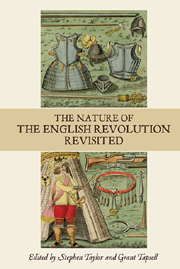Book contents
- Frontmatter
- Contents
- Preface and Acknowledgements
- List of contributors
- List of Abbreviations
- 1 Charles I and Public Opinion on the Eve of the English Civil War
- 2 Rethinking Moderation in the English Revolution: The Case of An Apologeticall Narration
- 3 The Parish and the Poor in the English Revolution
- 4 Body Politics in the English Revolution
- 5 The franchise Debate Revisited: The Levellers and the Army
- 6 Oliver Cromwell and the Instrument of government
- 7 ‘de te fabula narratur’: The Narrative Constitutionalism of James Harrington's Oceana
- 8 Democracy in 1659: Harrington and the Good Old Cause
- 9 The Restoration of the Church of England, 1660–1662: Ordination, Re-ordination and Conformity
- 10 Style, Wit and Religion in Restoration England
- 11 A British Patriarchy? Ecclesiastical Imperialism under the Later Stuarts
- Index
- Studies in Early Modern Cultural, Political and Social History
2 - Rethinking Moderation in the English Revolution: The Case of An Apologeticall Narration
Published online by Cambridge University Press: 05 July 2013
- Frontmatter
- Contents
- Preface and Acknowledgements
- List of contributors
- List of Abbreviations
- 1 Charles I and Public Opinion on the Eve of the English Civil War
- 2 Rethinking Moderation in the English Revolution: The Case of An Apologeticall Narration
- 3 The Parish and the Poor in the English Revolution
- 4 Body Politics in the English Revolution
- 5 The franchise Debate Revisited: The Levellers and the Army
- 6 Oliver Cromwell and the Instrument of government
- 7 ‘de te fabula narratur’: The Narrative Constitutionalism of James Harrington's Oceana
- 8 Democracy in 1659: Harrington and the Good Old Cause
- 9 The Restoration of the Church of England, 1660–1662: Ordination, Re-ordination and Conformity
- 10 Style, Wit and Religion in Restoration England
- 11 A British Patriarchy? Ecclesiastical Imperialism under the Later Stuarts
- Index
- Studies in Early Modern Cultural, Political and Social History
Summary
One noteworthy feature of the English revolution was the desire of virtually all participants to claim the mantle of moderation. We might, depending upon the magnification of our scholarly lens, attribute this tendency either to the peculiarities of English political culture, or to the lingering Aristotelianism of the long European Renaissance, or to the almost infinite capacity of human beings for rationalization. But whatever the reason, it is striking that moderation was everywhere in early modern England's bloodiest conflict, giving it a somewhat different tone or mood from later European revolutions. John Morrill described nearly four decades ago the intense desire for moderation espoused by neutrals who resisted the ideological extremism that was leading the nation to ruin. But similar rhetoric can be found in the writings of the most committed royalists, levellers, presbyterians, independents, and more or less everyone else. A simple word search of Early English Books Online yields 165 books with ‘moderate’ or ‘moderation’ in their titles published between 1640 and 1660. Notable examples include: The Tablet or Moderation of Charles I, Martyr (1649), a royalist panegyric by John Arnway who also, apparently contradictorily, wrote No Peace ‘till the King Prospers (1645), insisting that Charles make no concessions; Moderation Justified (1644), a sermon to the Long Parliament by the presbyterian Thomas Thorowgood denouncing the celebration of Christmas; an attack on parliament for insufficient zeal in bringing Charles I to justice, particularly condemning the wealth of M.P.s, entitled A Moderate and Cleer Relation of the Private Souldierie of Colonell Scroops and Col. Sanders Regiments (1648); and, perhaps most famously, the revolutionary newspaper and occasional propaganda organ of the Levellers, published in sixty-three weekly issues from June 1648 to September 1649, known simply as The Moderate.
- Type
- Chapter
- Information
- The Nature of the English Revolution Revisited , pp. 27 - 52Publisher: Boydell & BrewerPrint publication year: 2013



